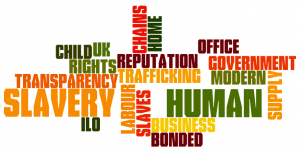Details awaited on government plans to require business to deal with supply chain slavery
 The Home Office surprised human rights campaigners this week with an announcement that it plans to include measures in the Modern Slavery Bill to address slavery in global supply chains. CORE Director, Marilyn Croser, offered a cautious welcome to the news saying, “We are delighted with Karen Bradley’s announcement that the government will include supply chain measures in the Modern Slavery Bill. We are keen to see more details of the proposal: Which companies will be covered? Who will be consulted? What information will be reported?”
The Home Office surprised human rights campaigners this week with an announcement that it plans to include measures in the Modern Slavery Bill to address slavery in global supply chains. CORE Director, Marilyn Croser, offered a cautious welcome to the news saying, “We are delighted with Karen Bradley’s announcement that the government will include supply chain measures in the Modern Slavery Bill. We are keen to see more details of the proposal: Which companies will be covered? Who will be consulted? What information will be reported?”
Initial signals from the Home Office are encouraging. On Monday, Minister Karen Bradley wrote to the chairs of the public bill committee informing them of the government’s intention to table an amendment on supply chains. Reflecting on the contributions to the debate from NGOs and business, the minister wrote, “Our hope is that once it is clear to see what activity major businesses are undertaking, public pressure and competition between businesses will encourage others who have not taken steps to do so”.
CORE and some of our members recently teamed up with a group of anti-slavery and human rights organisations to press for an amendment to the bill, calling for transparency in supply chains (TISC). In light of this week’s government announcement, our focus is now on ensuring legislation covers the right companies and includes reporting regulations that will promote effective actions on the ground. 
Slavery: a lucrative business
Most of the items that we need and use on a daily basis – food, clothing, mobile phones, computers, cars, our children’s toys – are now produced outside of the UK or include materials sourced elsewhere. Too often, companies aren’t aware of every producer or contractor within their global supply chains, let alone the employment practices undertaken by their suppliers.
To put the scale of this problem into perspective: more people are trafficked each year than the total number trafficked in the 350 years of the transatlantic slave trade. An estimated 21 million people in the world today live in some form of modern slavery. The majority of them are in private sector activities. And we are talking big business! The International Labour Organization estimates the profit made from the illegal trafficking of people to be around US$150 billion a year.
The sad truth is that many UK companies benefit, whether knowingly or unknowingly, from cheap labour in their supply chains. To rectify this, we argue that all big companies operating in the UK (not just listed companies) must be required to report on what they’re doing to tackle slavery within their supply chains. The reporting must be effective, based on robust principles and evidence-based criteria, not just empty aspirational statements. This is not about wrapping business practices in more red tape. These regulations would help corporations to enhance their reputations, improve employee morale and avoid legal sanctions. Ultimately, it would be to the benefit of everyone.

